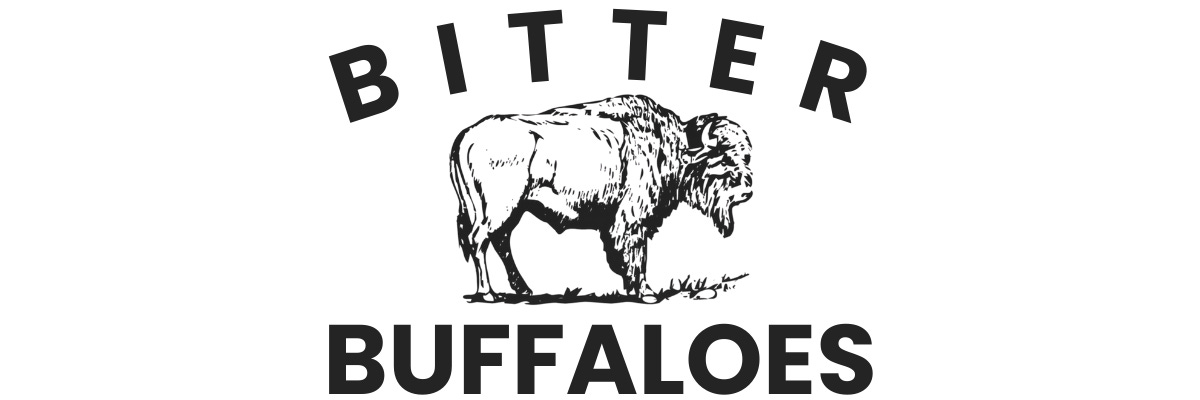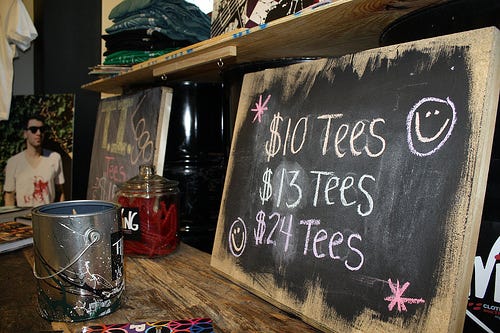I got together last night with my friend Christopher Sellers, who writes a smart, searching Substack about creativity in all its forms. We ended up talking about the craft of writing, the pressure to produce endlessly, and the diminishing returns of constant output. None of this is new ground—but it’s ground worth walking again, especially now, when the systems we work inside are so hostile to the slow, uncertain process of making real art. A few loosely gathered thoughts follow.
Art is not content
“Content” is designed to be consumed. It’s optimized for visibility, algorithmically tuned for reach, engineered to be scrolled, liked, and forgotten. Its purpose is not to endure but to fill a gap between ads, to binge one more episode—and then disappear. Not convinced? Reed Hastings, former Netflix CEO, once said his company’s biggest competitor is sleep.
Art isn’t trying to be viral. It’s trying to be true. It’s an attempt to express something that resists expression—to capture what’s difficult, dangerous, or ineffable. Art isn’t efficient. It’s not optimized. It often misses the mark. That’s what gives it weight. Hell, if a work doesn’t have the possibility of failure, I don’t think we can consider it art.
So when you call me a “content creator,” you’re not just using a different word. You’re collapsing everything I do—everything I am—into a machine that exists to populate your feed. I’m not here to churn. I’m not packaging disposable slices of my life to goose your metrics. I’m trying to wrestle meaning from entropy. To say something that matters in a world that increasingly doesn’t want to hear it.

The word “content” is violence. It flattens Michael Chabon and John Banville into the same frame as whatever brand-friendly nothing you saw ten seconds ago. It treats years of learning, risk, failure, and persistence as equivalent to a clip of someone chewing cereal into a ring light.
It’s not the same thing. It’s fucking not. And we lose something every time we pretend it is.
The business incentive to have you drink from a firehose creates a system designed for there to never be enough
The economics are brutal in their simplicity: keep you scrolling, profit.
Every second you spend on their app translates to ad revenue, data harvesting, and behavioral manipulation. They’ve weaponized your neurology against you.
The dopamine hit from a notification, a like, a new video in your feed—this isn’t accidental. It’s engineered. Tech companies employ neuroscientists and behavioral psychologists to make their products as addictive as possible.1 They study the same reward pathways exploited by gambling and drug companies. Variable ratio reinforcement schedules. Intermittent reward systems. These are the exact mechanisms that create compulsive behavior.
You used to choose what to read, watch, listen to. You went to the theatre to see a film, chose among your records or CDs when listening to music, walked to your bookshelves when thirsty for new blood. You had preferences. Taste.
But now the For You algorithm has overwritten all of that, feeding you not what you love, but what will keep you locked in. It doesn’t care about your actual interests so much as your engagement patterns. Zero fucks are given trying to feed your soul; it’s trying to extend your session.
That’s why every platform pushes infinite scroll, autoplay, “suggested for you.” They’re not trying to satisfy you. Satisfaction makes you log off.

They’re trying to keep you in a perpetual state of almost-satisfaction. A kind of engineered craving where the next post, the next video, the next hit might be the one that finally delivers.
But it never does.
And writers, artists, creators get caught in this machine.2 We’re told our work needs to be “discoverable,” needs to “engage” with the algorithm. So we start shaping our art around what the machine rewards: faster, louder, more frequent, more polarizing.
We become complicit in our own artistic destruction, optimizing not for meaning, but for metrics.
Gotta get those clicks, man!
And we call this creative strategy.
Instant gratification diminishes our appreciation of the work
We’ve trained ourselves to expect immediate payoff. A joke every few seconds. A revelation in every paragraph. A dopamine hit in every scroll. This is the Marvel formula—mechanically engineered beats designed to keep you hooked without ever challenging you. What felt electrifying in Iron Man has become stale comfort food. But it’s taught us to expect art to work the same way.
The problem isn’t just that our attention spans are short. The problem is that even when real art breaks through, when something brilliant manages to pierce the algorithmic noise, we consume it the same way we consume everything else. You binge The Bear or Succession or whatever actually good show slips through the cracks, and the moment the credits roll, the platform is already queuing up the next hit.
"People who watched this also enjoyed..."
There’s no space to sit with what you just experienced. No time to let it settle, to return to it, to discover what it might mean beyond the initial hit. The delivery system is designed to immediately pull your attention elsewhere, because reflection doesn’t generate engagement metrics.
We haven’t lost only the ability to focus in the moment, but our ability to sit with something and let it settle into our pores.
Real art often works on a delay. It plants something in you that grows over time, that reveals new layers when you return to it months or years later. But when everything gets flattened into the same consumptive cycle, even masterpieces become just another item in your viewing history.
The platform doesn’t distinguish between art and content. So neither do we.
And that’s how we end up treating There Will Be Blood the same way we treat a compilation of TikTok fails: something to be consumed, rated, and immediately forgotten in favor of whatever’s next in the queue.
This algorithmic structure has created a schism between the value in the work an artist creates and the sense of society’s entitlement to that work
We are drowning in artistic output. For ten bucks a month, I can access basically every song ever recorded. Every movie worth watching. Millions of books. The mechanisms that make art widely available have severed our experience of consuming it from any understanding of what it takes to create it.
When you stream a song on Spotify, it feels weightless. Costless. Like it materialized out of thin air, rather than being the product of years spent learning an instrument, writing, recording, mixing, mastering. Not to mention the financial risk, the creative struggle, the thousand small failures behind that one track you're half-listening to while checking your email. We’ve made it nearly impossible for musicians to earn a living. We’ve reduced our bands to t-shirt salespeople.
The same dynamic plays out everywhere. Netflix makes every show feel effortless to produce. Amazon makes every book seem like it just appeared on a shelf. The platforms have abstracted the labor so thoroughly from the product that we’ve started to believe creation is natural, not made.
And now we’re building AI designed to replace human creativity, while insisting that human creativity has no value worth protecting. OpenAI can swallow every book in print to train GPT-5 and refuse to compensate the authors because the model “transforms” the work. Right. Just like a photocopier “transforms” a document by making it slightly blurrier.
About once a month, someone asks me how to become a good writer. I tell them the truth: you read everything you can get your hands on—Dickens, romance novels, comics, cereal boxes. You consume writing like your life depends on it. Then you write so much it stops being painful because you can’t get your thoughts on the page, and starts being painful because you can. Because now you’re starting to see what your mind actually thinks.
You suck at it for a long time. Then you suck at it a little less. You keep going, page after page, learning from everything you’ve read—how writers build suspense, diffuse tension, make complicated things clear. And the truth is: you never arrive. You’re always just sucking a little less.
They never like this answer. They want the hack. The shortcut. The secret technique. They don’t want to hear that it’s mostly just showing up and doing boring, invisible work—day after day, for years.
But this is what we’ve lost sight of: art isn’t magic. It’s work. Difficult, time-consuming, often financially ruinous work. And we’ve built an entire economy designed to make that work invisible, to make us forget that someone, somewhere, spent years learning how to do the thing you’re consuming without even thinking about it.
It’s several years old now, but The Social Dilemma is a good watch. What Netflix doesn’t tell you is its model is exactly the same as the social media apps its film criticizes. It’s the same model as Spotify. All of it. All of it.
I’m revising Pennhollow right now and started reading up on how to land an agent. A dispiriting amount of it is just platform advice: grow your audience, boost discoverability, feed the machine. After spending years writing something that refuses all of that logic, I’m told the next step is to make myself into content.





writing a comment so that they publish your book
Glad I could be a muse on this one.